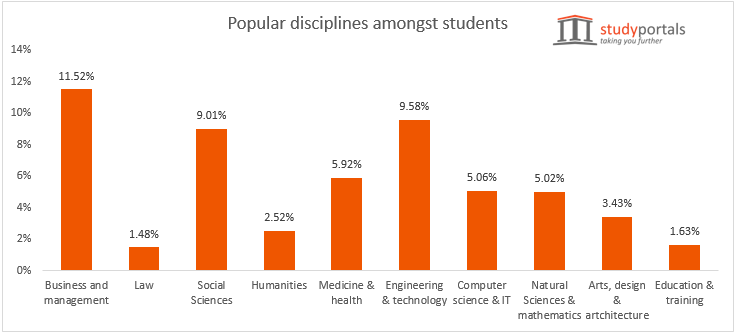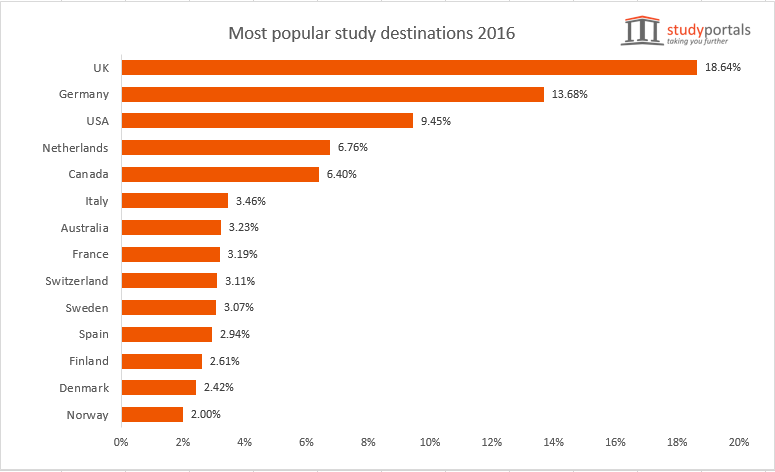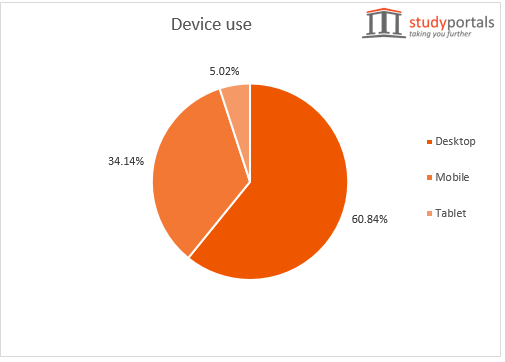Destination anywhere: How students decide where to study
Having an experience abroad is considered indispensable for a student’s resume. More and more students decide to take the step and spend (part of) their studies in a different country. It has been long since universities started to realise the importance of internationalization and the potential it has for both universities and students alike. Choosing where to study abroad is probably the most important decision that students make in their lifetime. We did some research on the most important aspects that students focus on when deciding on a study destination, and identified the three most important factors: subject, country, and the language of instruction.
(Slides from EAIE 2016 session on Destination anywhere, together with Hobsons).
Subject.
For prospective students, deciding WHAT to study is often far more important than deciding WHERE to study. The decision on the subject of their studies comes first for 62% of students and is usually influenced by personal preferences, aptitudes, and even cultural and social factors.
Whilst the popularity can differ per country, the most popular subjects students choose from are usually Business & Management, Engineering and Social Sciences.
Country.
The next step in the study choice process for most students involves the question of WHERE. When deciding where to study, the destination country is an important aspect for students. Most students choose Anglophone countries such as the United Kingdom, United States, Canada and Australia. The choice of countries is quite logical when considering the availability of English-taught programmes in these countries, which is an important driver of international education. On our portals, students are usually searching for study programmes in the United Kingdom, Germany, United States, Netherlands, Canada, Italy, Australia, France or Switzerland.
Hobsons found three things students find most important when deciding in which country to study:
- The quality of the education offered compared to home.
- International recognition of qualifications.
- The host country’s attitude towards international students.
Language.
One more practical part in the decision of where to study is based on the language of courses offered. In total, over 100,000 English-taught bachelor’s and master’s programmes are offered in the world by 2,450 universities.
Students indicate that they mostly prefer the university website for finding relevant study information, and they would easily spend over 15 minutes to find most information. This is why it is important for universities to be visible to students. Therefore, it is key for universities to know how students search and what they search for. Based on the data we gather on our portals, we found that almost 35% of our users search via mobile phone, which is why having a mobile-friendly website is critical for universities recruiting international students.
The information students are most looking for on university websites:
- Course information
- Entry requirements
- How to apply information
- Scholarship information
- Accommodation information
- Career outcomes
- Contact details
- How to enquire
- Institution rankings
- Subject rankings
When students choose between institutions, they pay attention to several factors (Hobsons):
-
- The academic reputation / ranking of a university
- The subjects available to study
- Facilities available
- The quality of teaching
Once the student has found interesting information about a programme, often some questions will arise. Research done by Hobsons indicates that students value responsiveness of universities. When students send an enquiry, 53% of students expect an answer from the university within 24 hours. However, for 43% of the Top 500 universities, it takes 2 days or longer to reply, and 21% of those universities do not send a response at all (Source: Through student eyes). By replying promptly to student enquiries, universities can truly differentiate themselves from other universities. Whatsapp and Facebook Messenger are considered the future of student communication, which indicates a preference for direct and responsive contact between students and universities.
To conclude, students’ decision on where to study is based on 3 main factors: the subjects offered, the destination country, and the language. Universities should ensure they are visible to students from all over the world in order to attract the best students. Next to that, universities should be proactive in their communication strategies and adapt them to students’ needs and wishes. Nowadays being responsive is one of the biggest assets for universities, and a must in international student recruitment and universities that can improve their responsiveness can truly turn it into a unique selling proposition.
For more updates, follow us!









